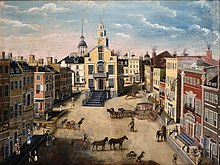William Jackson (Boston loyalist)
His mother, Mary, a widow, owned a general store located in Cornhill, MA in Boston named "The Brazen Head.
[2] Originally owned by Mary Jackson, the Brazen Head was a general store located in Cornhill, an area in the heart of Boston.
[3] It can be deduced, then, that the Brazen Head was an important and highly trafficked store due to its centrality within Boston and its location next to the Town House.
The advertisement stated, "Several sorts of glass bottles, as also goods velvet corks, to be sold by Mr. Belthazar Bayard, next door to Brazen Head in Cornhil, Boston.
[6] According to a newspaper article in the Boston Evening Post, "[The fire] began about two o'clock in the morning, in the dwelling house of Mrs. Mary Jackson and Son, and the brazen head in Cornhill, but the accident which occasioned it is yet uncertain.
Initially, the non-importation agreement created by Boston merchants was designed to have a definite time frame, specifically between January 1769 and December 1769.
Archer additionally wrote, "On May 2, after a report by the second committee, the body of merchants concluded that only six of the 211 signers of the Agreement had broken their word 'through Inattention,' by neglecting to countermand their orders placed in the fall.
Larger businesses were able to continue profiting during this time period, but family owned stores such as the Brazen Head did not have the capital or domestic connections necessary to prosper without importing goods.
The newspaper printed a list of those who "audaciously" continued to import British goods, and singled out specific merchants as traitors to the revolutionary cause.
Despite the clear economic strain that nonimportation was putting on Boston businesses, the Sons of Liberty wasted no time in shaming those who continued to import and sell British goods.
After the May 2nd meeting cited earlier, the Sons of Liberty began publishing the names of storeowners who did not comply with the Non-Importation Agreement in Boston newspapers.
The broadside read, "WILLIAM JACKSON, an IMPORTER; at the BRAZEN HEAD, North Side of the TOWN-HOUSE, and Opposite the Town-Pump, [in] Corn-hill, BOSTON.
In late 1769 or early 1770, the approximate time frame when the broadside was first posted, an angry mob surrounded the Brazen Head and other Boston stores whose owners failed to comply with nonimportation.


